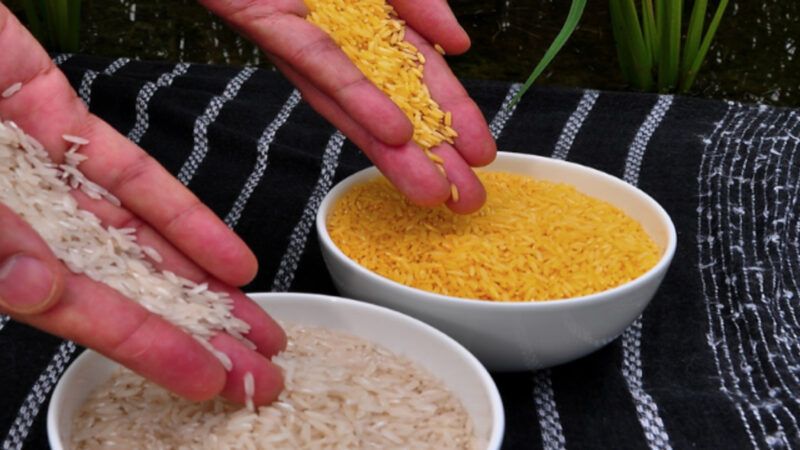Evil Greenpeace Objects to Philippines' Approval of Genetically Improved Golden Rice
Nobel laureates properly call activist group's campaign against crop biotechnology a "crime against humanity."

Golden Rice, which has been genetically engineered to have higher levels of the vitamin A precursor beta-carotene, has finally received regulatory approval for planting by farmers in the Philippines. The grain gets its name from the golden hue imparted to it by the beta-carotene. Greenpeace anti-biotech activists have been slinging low, dishonest neoluddite propaganda against golden rice since it was developed by a Swiss non-profit back in 1999. So predictably, the group decried the Philippines' regulatory approval for planting the genetically improved rice variety last month.
"Greenpeace Philippines strongly denounced the approval of genetically modified 'Golden Rice' (GR) for commercial propagation and called on Department of Agriculture (DA) Secretary William Dar to reverse the decision and represent the interests of Filipino farmers and consumers," reads the Greenpeace press release.
Regulatory approval of the grain in the Philippines is a big step toward improving the health of some of the poorest people on the planet. As AgDaily notes, "a one-cup portion of cooked Golden Rice contains enough beta-carotene to meet 30 to 50 percent of the estimated average requirement of vitamin A for children aged 6 months to 5 years, the group most at risk of vitamin A insufficiency in the Philippines. At present, only 2 out of 10 Filipino households meet the estimated average requirement for vitamin A intake in their daily diet."
Vitamin A deficiency causes blindness in between 250,000 and 500,000 children each year, half of whom die within 12 months, according to the World Health Organization. A study by German researchers in 2014 estimated that activist opposition to the deployment of Golden Rice has resulted in the loss of 1.4 million life-years in just India alone. Since 2005, an estimated 14 million children worldwide have died of Vitamin A deficiency and an estimated 3.5 million to 7 million are permanently blind.
Back in 2016, a group of 100 Nobel Laureates issued an open letter to Greenpeace demanding that the anti-technology activist group "cease and desist in its campaign against Golden Rice specifically, and crops and foods improved through biotechnology in general." The laureates pointed out that "scientific and regulatory agencies around the world have repeatedly and consistently found crops and foods improved through biotechnology to be as safe as, if not safer than those derived from any other method of production. There has never been a single confirmed case of a negative health outcome for humans or animals from their consumption. Their environmental impacts have been shown repeatedly to be less damaging to the environment, and a boon to global biodiversity."
The laureates' letter ended:
WE CALL UPON GOVERNMENTS OF THE WORLD to reject Greenpeace's campaign against Golden Rice specifically, and crops and foods improved through biotechnology in general; and to do everything in their power to oppose Greenpeace's actions and accelerate the access of farmers to all the tools of modern biology, especially seeds improved through biotechnology. Opposition based on emotion and dogma contradicted by data must be stopped.
How many poor people in the world must die before we consider this a "crime against humanity"(emphasis theirs)?
If not a prosecutable crime, Greenpeace's decades-long campaign against modern crop biotechnology is a disgraceful disservice to their fellow human beings.


Show Comments (51)